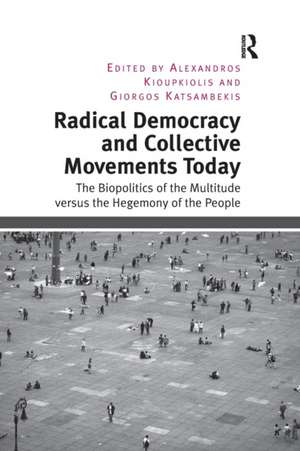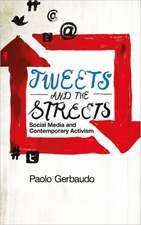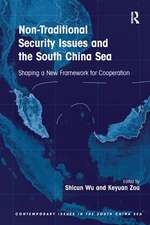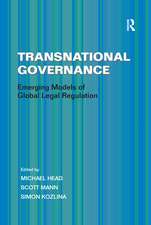Radical Democracy and Collective Movements Today: The Biopolitics of the Multitude versus the Hegemony of the People
Autor Alexandros Kioupkiolis, Giorgos Katsambekisen Limba Engleză Paperback – 19 oct 2016
| Toate formatele și edițiile | Preț | Express |
|---|---|---|
| Paperback (1) | 469.34 lei 6-8 săpt. | |
| Taylor & Francis – 19 oct 2016 | 469.34 lei 6-8 săpt. | |
| Hardback (1) | 1060.25 lei 6-8 săpt. | |
| Taylor & Francis – 11 iun 2014 | 1060.25 lei 6-8 săpt. |
Preț: 469.34 lei
Nou
Puncte Express: 704
Preț estimativ în valută:
89.80€ • 94.27$ • 74.54£
89.80€ • 94.27$ • 74.54£
Carte tipărită la comandă
Livrare economică 10-24 aprilie
Preluare comenzi: 021 569.72.76
Specificații
ISBN-13: 9781138249028
ISBN-10: 1138249025
Pagini: 258
Dimensiuni: 156 x 234 x 14 mm
Greutate: 0.45 kg
Ediția:1
Editura: Taylor & Francis
Colecția Routledge
Locul publicării:Oxford, United Kingdom
ISBN-10: 1138249025
Pagini: 258
Dimensiuni: 156 x 234 x 14 mm
Greutate: 0.45 kg
Ediția:1
Editura: Taylor & Francis
Colecția Routledge
Locul publicării:Oxford, United Kingdom
Notă biografică
Dr Alexandros Kioupkiolis is a lecturer in contemporary political theory at the Faculty of Law, Economics & Political Sciences of Aristotle University of Thessaloniki, Greece. Previously, he has also taught political philosophy at the University of Cyprus. He has studied Political Theory at the Universities of Essex (MA) and Oxford (DPhil). Giorgios Katsambekis studied Political Science at the Aristotle University of Thessaloniki, where he also received his MA degree in Political Analysis in autumn 2009. He is a PhD candidate at the School of Political Sciences of the same university.
Recenzii
’People or Multitude, Hegemony or Autonomy, Laclau or Negri? This is the crucial dilemma the age of resistance we have entered poses to theory and politics. This sophisticated volume brings together some of the most interesting younger scholars to examine the many aspects of the dilemma. The alternatives are mapped in their full complexity and are backed with detailed empirical evidence from the movements in Spain, Greece and Occupy. This collection will become a classic in radical political philosophy.’ Costas Douzinas, Birkbeck, University of London, UK ’At a time when we have to make sense of the worldwide protests unfolding since 2011 this book comes at exactly the right moment. Intervening into the heated debates around the question of political representation and the necessity of constructing a new left wing hegemony, this book is a must-read for everyone interested in the topic of collective protest.’ Oliver Marchart, Düsseldorf Art Academy, Germany
Cuprins
Introduction, Alexandros Kioupkiolis, Giorgos Katsambekis; Chapter 1 Post-hegemony: Politics Outside the Usual Post-Marxist Paradigm, Benjamin Arditi; Chapter 2 Letter to a Greek Anarchist: On Multitudes, Peoples, and New Empires, Richard J.F. Day, Nick Montgomery; Chapter 3 Sovereignty of the People, Jodi Dean; Chapter 4 Occupy and Autonomous Political Life, Saul Newman; Chapter 5 Hegemony or Post-hegemony? Discourse, Representation and the Revenge(s) of the Real, Yannis Stavrakakis; Chapter 6 Generalized Antagonism and Political Ontology in the Debate between Laclau and Negri, Paul Rekret; Chapter 7 A Hegemony of the Multitude: Muddling the Lines, Alexandros Kioupkiolis; Chapter 8 The Multitudinous Moment(s) of the People: Democratic Agency Disrupting Established Binarisms, Giorgos Katsambekis; Chapter 9 Representation and Political Space in Laclau and Hardt and Negri, Andy Knott; Chapter 10 Autonomy and Hegemony in the Squares: The 2011 Protests in Greece and Spain, Marina Prentoulis, Lasse Thomassen;
Descriere
The ’Arab spring’, the Spanish ’Indignados’, the Greek ’Aganaktismenoi’ and the ’Occupy Wall Street’ movement all share a number of distinctive traits. Similar features have marked collective resistances from the Zapatistas and the Seattle protests onwards, giving rise to theoretical and practical debates over the importance of these ideological and political forms. By engaging with the controversy between the autonomous, biopolitical ’multitude’ and the arguments in favour of the hegemony of ’the people’ the central aim of this book is to probe the innovative practices and ideas that have developed and to debate their potential to reinvigorate democracy whilst seeking something better than ’disaster capitalism’.






























